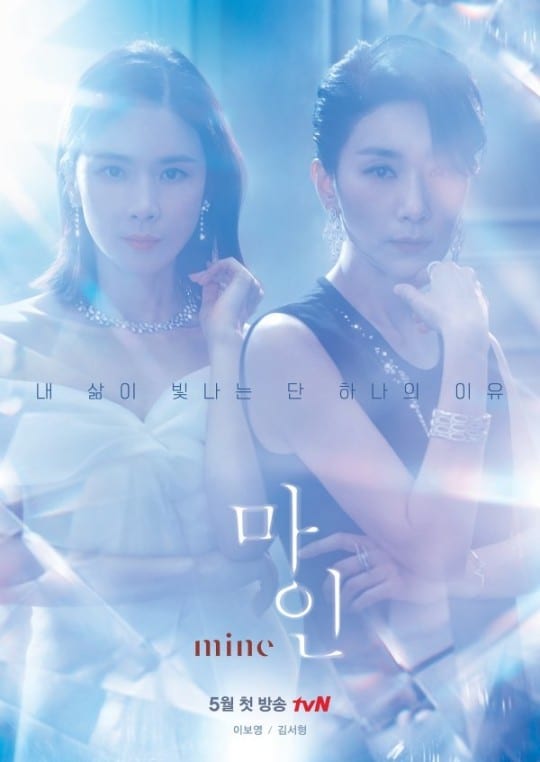
The final episode of Mine, tvN’s latest hit chaebol melodrama, passed the 10% mark in viewership — a good number for a cable drama that intrigued audiences right up to the end.
In the show, a highly recommended tutor and maid in dire straits enter the sprawling Han estate as the family patriarch falls into a sudden coma. These three events set off a cascade of increasingly dramatic events that test the family and culminate in murder.
While the overall mechanics of the drama are strong and serve the main storyline, a lack of care given to some subplots and characters (including those with disabilities) dull some of the drama’s shine. That being said, the main story of two daughters-in-law working together to protect the ones they love and take back what is theirs is captivating enough to largely ignore these unforced errors, if not forgive them.
If you enjoy chaebol aesthetics, positive (albeit kiss-shy) LGBTQ+ representation, meta-references, female bonding, twists on twists, the AITA subreddit and aren’t too fussy about class politics, then you may find Mine right up your alley.
Warning: The following includes heavy spoilers.
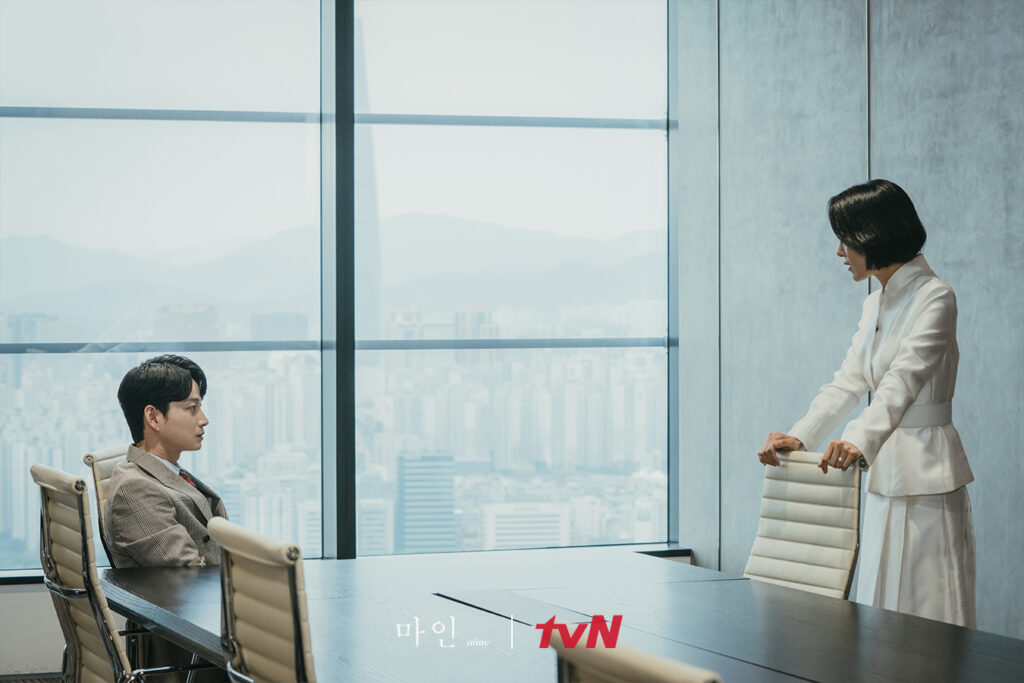
I am not a prolific K-drama viewer, but Netflix’s algorithm has me figured out after I binged SKY Castle and VIP, wasting no time in recommending yet another glitzy chaebol drama. My familiarity with Lee Bo-young (I Hear Your Voice, God’s Gift — 14 Days) and curiosity to see more of SKY Castle villain Kim Seo-hyung were just added bonuses as I settled in to watch what I thought was going to be a drama about women competing against each other in shiny buildings and fancy clothes.
Mine takes great glee in pulling the rug out from under the premise presented in the first episode as it reveals that self-sacrificing Jung Seo-hyun (Kim), headstrong Seo Hi-soo (Lee) and self-righteous Lee Hye-jin (Ok Ja-yeon, The Uncanny Counter) are all being played by the seemingly agreeable Han Ji-yong (Lee Hyun-wook, #Alive).
Underneath the perfect visage of loving family man and exemplary executive lies a narcissist. Ji-yong is a textbook abuser. The drama lays the blame at the feet of the three parental figures who failed to raise him with love, which is also used to explain his decision to rekindle his love affair with Hyejin and sneak her into his home as tutor Kang Jae-kyung. Ji-yong wants Ha-joon (Jung Hyeon-jun, who also played the son in Parasite) to grow up with all the love he missed out on; where he fails is thinking he could successfully control Hyejin and keep Hi-soo in the dark.
Mine shows Ji-yong being vulnerable and loving in the most insidious way possible — he only wants the best for Ha-joon because he sees his son as an extension of himself and craves to give him what he missed out on, never mind that he already has a devoted mother in Hi-soo. Ji-yong’s entitlement is further hammered home when he focuses almost exclusively on his unborn second child and disregarding his wife who is carrying said child.
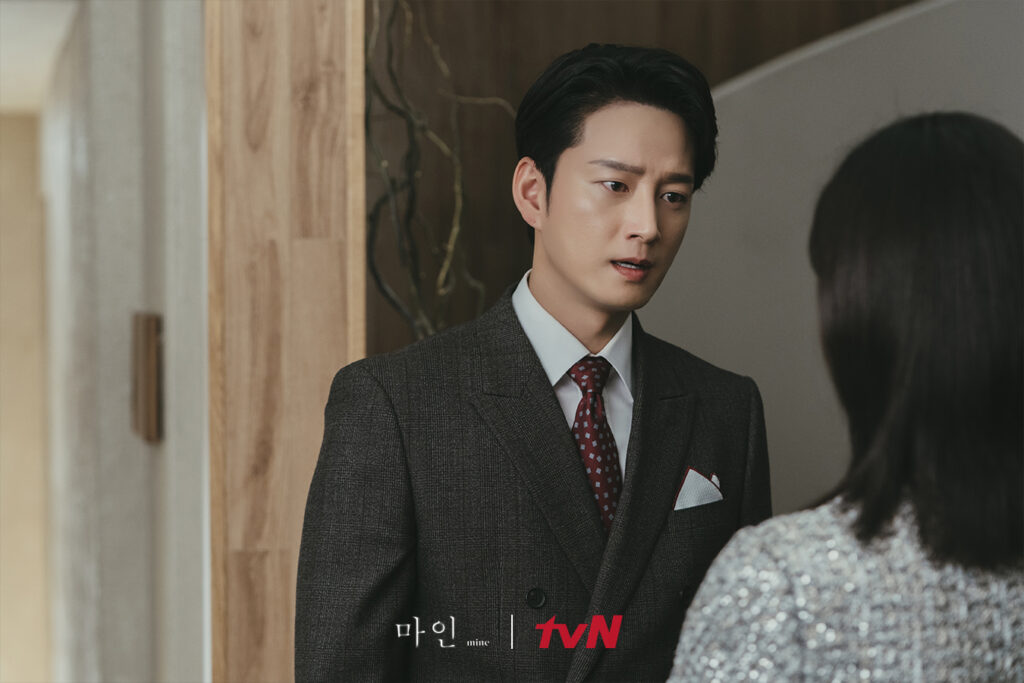
There are points when Ji-yong’s villainy could have turned cartoonish, like with his self-centredness around Hi-soo’s pregnancy and the dehumanising “dog” fights he funds. Mine, however, successfully frames them for the horrors they are through the lens of the women he has betrayed. Their fear for Ha-joon’s wellbeing is foremost, but they also recognise the harm being done to them, too.
The characterisation of Ji-yong and the plotting of his demise are one of the drama’s biggest strengths. Lee Hyun-wook is just as scary effortlessly gaslighting his adoptive mother Soon-hye (Park Won-sook, The Last Empress) as he is being violent towards Hye-jin.
Another strength is Kim Seo-hyung’s performance. As the responsible eldest daughter-in-law, she dedicates her entire public identity to protecting the Hyowon name. Eyes brimming with unshed tears, Seo-hyun’s only indulgence is a complex born from her love of art. Ji-yong thinks that holding his sister-in-law’s sexuality over her head will be enough to cow her and take down his biggest competition for the Hyowon throne. His behaviour instead fuels her growing disillusionment and pushes her to continue protecting her family, but now on her own terms.
Mine keeps the homophobia in the background, which is always welcome. Ji-yong cares more about how he can exploit Seo-hyun’s sexuality; but when he uses it to try and turn Hi-soo against her, it instead makes the women’s bond stronger. Realising she had ignorantly denied Seo-hyun a chance to be more open with her, Hi-soo voices her belated but still sweet acceptance.
Another moment of acceptance comes from husband Jin-ho (Park Hyuk-won, Secret Love Affair). It is clear that gold-spoon Seo-hyun married down, hiding her sexuality by becoming a second wife and stepmother. She overcompensates for her part in the sham marriage with a strong sense of responsibility towards the Han family and their company. Nervously coming out to Jin-ho and his unperturbed response (he appears more impressed that she didn’t have an affair) lead to the first honest moment in the marriage.
Seo-hyun’s vulnerability also gives Jin-ho the emotional connection he craves, becoming more and more supportive of his wife in the final episodes. He is also the character who gives voice to Mine’s approach to Seo-hyun’s sexuality:
But must you tell the world when your husband’s fine with it? Your sexual identity has nothing to do with your competence.
The only characters to whom Seo-hyun comes out are her husband and Mother Emma (Ye Soo–jung, Do You Like Brahms?, Train to Busan), a nun serving as a discreet counsellor for members of the Han family and as an exposition fairy for the viewer. No one else who needs to know — or would react poorly — ends up knowing. Anyone who does know does not act personally affronted. Indeed, Mother Emma apologises to Seo-hyun for the discrimination she faces.
It is definitely interesting to see Mine include representations of both LGBTQ+ people and Christians. It feels like a conscious decision to show how both groups can live harmoniously, which was sadly contradicted in real life.
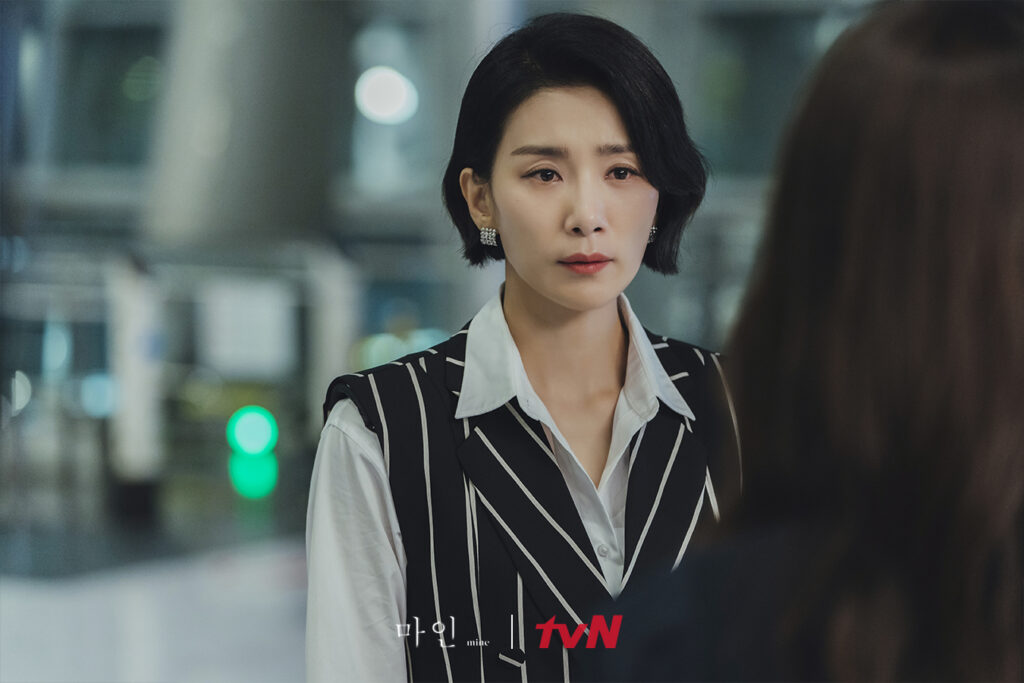
Actress Kim Jung-hwa, who protrays Seo-hyun’s love Suzy Choi, is married to Christian singer You Eun-sung. When questioned by a commenter on Instagram about Kim’s role, You responded that: it wasn’t the main plotline; it was just noise marketing by the producers; he and his wife do not support homosexuality, and; that the character “returns to normal”.
After receiving backlash for both the nature of his comments and potentially spoiling the drama, You quickly followed an apology from Kim’s agency with a vague one of his own on Instagram. Thankfully, Mine shows Seo-hyun arranging to visit Suzy in the finale, like any normal couple in love would do.
While tame, Seo-hyun’s storyline is treated seriously. It is great to see such progressive material in K-dramas, which is included with more than the domestic audience in mind. Having already worked directly with Netflix, Mine‘s production company Studio Dragon recently inked a deal with Apple TV+ to create an American TV show; many technology companies in South Korea are increasingly working internationally. With Korean-created content being consumed, cloned — and critiqued — more widely, it makes sense that production houses like Studio Dragon are purposely keeping both international (read: US/Western) audiences and international (read: Hollywood) opportunities in mind.
The only blight to the show’s LGBTQ+ representation may be a side plot where the staff think Jin-ho is gay. This pays off in the main plot to help foil the murder investigation, but some may feel that the play for cheap laughs was unnecessary.
To be fair, Mine has a few of these plotlines that, while adding levity, are silly more than comedic. This sometimes seems intentional, with the slapstick accompanying scenes with the Han matriarch and daughter seeming tired, and thus sad like the characters. An example where this works best is Jin-hee’s (Kim Hye-hwa, Idol, Real) meltdown parodying the infamous nut rage incident — we see her at her lowest point and how she slowly and successfully works on her anger. Her mother is not as lucky, stuffing her face to the point where her attempts to fill the void in her heart is no longer subtext.
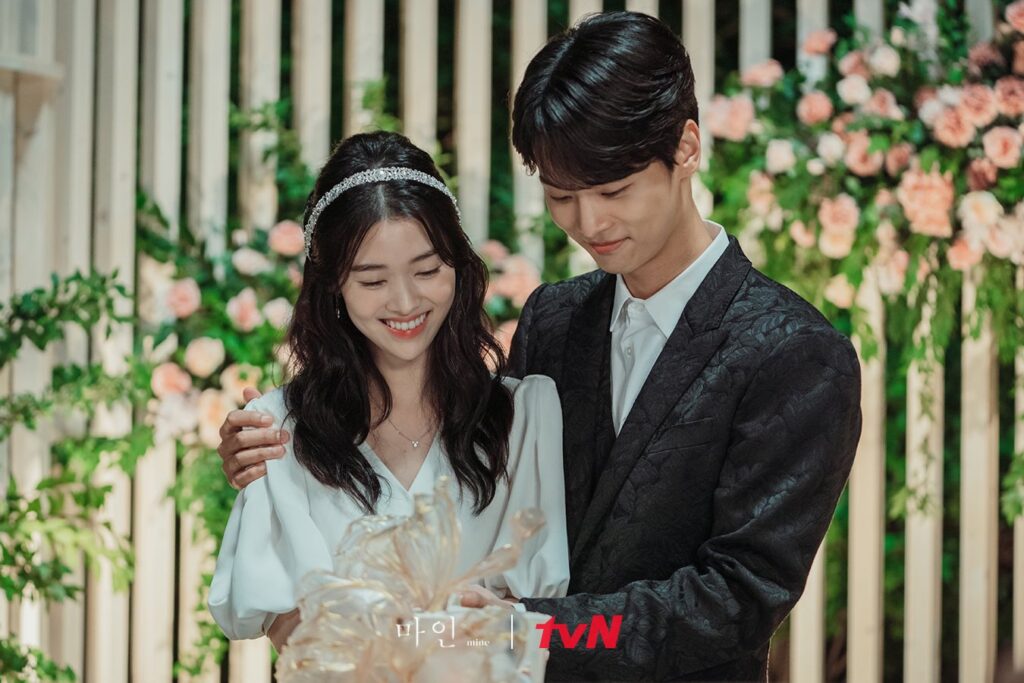
The show’s biggest misstep, though, is the fumbling of the romance between Hyowon scion Soo-hyuk (Cha Hak-yeon AKA Vixx leader N) and new maid Yu-yeon (Jung Yi-seo, Tale of the Nine-tailed, Parasite). The machinations that bring the two together might have worked as a meet-cute in a rom-com where it’s easier to not take things as seriously, but the premise doesn’t match the tone of Mine and hampers the building of any angst that could propel a romance in this genre.
As disappointing as it was that there was no kiss between the two, (would/could they have made the same decision with a straight couple?) the quick glimpses of Seo-hyun and Suzy’s past show us their affection for each other and shared passion for art. Unlike his stepmother and her lover, Soo-hyuk has very little in common with Yu-yeon. Their bed swapping is made out to be more profound than it ought to be and no amount of overdone pink filter can distract from these shortcomings. Seo-hyun nuzzling Suzy’s palm is far more sensual than the kiss Soo-hyuk and Yu-yeon share.
Already let down by the writing and editing, Cha and Jung also do not have the experience nor guidance to elevate the material the way Kim Seo-hyung can. The chemistry between the two is also nowhere near enough to overcome these flaws. Ultimately, this love story becomes an accessory for plot and character development. Soo-hyuk forsakes his fortune to be with Yu-yeon and its acceptance becomes a stop on Seo-hyun’s journey to self-acceptance while also manoeuvring her into the battle for Hyowon.
If Soo-hyuk is a pawn, then Yu-yeon is a white square on the board. The plotting of the drama saw many characters have a strong showing in the first half, only to fade away as the daughters-in-laws’ battle with Ji-yong, and later his murder investigation, take over the latter episodes. Hye-jin is one character who suffers from the reduced screen time after the trial, but she has a strong enough showing in the front half to make up for it. In contrast, the writing for Yu-yeon fails to attract the same kind of attention and she suffers for it in later episodes. Her presence in the finale is little more than a symbol of change in the Hyowon family.
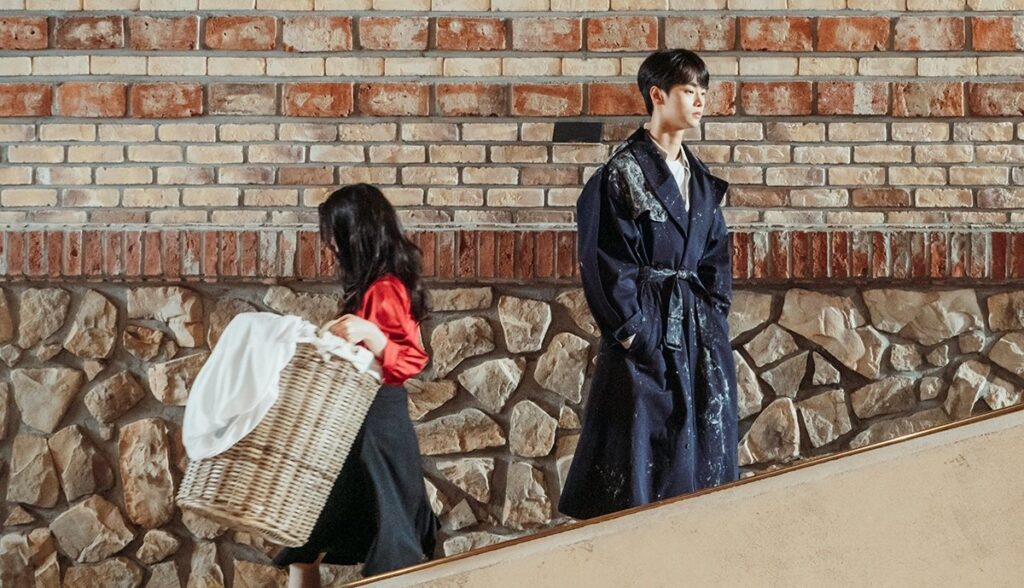
Soo-hyuk and Yu-yeon are meant to be a conduit for discussing class and economic discrimination, but the drama has a penchant for passing judgement on and punishing the staff for not being rich. Lack of wealth is treated as a moral shortcoming — of course they are going to try and steal the blue diamond, people are so grey!
The truth of the multilayered murder scene lays this attitude bare. Despite all the schemes and plans the rich Han family members engage in, it is the servants who directly cause Ji-yong’s death. Just like any other task they carry for their rich employers, they also end up doing the dirty work to take Ji-yong out of the picture. By being the ones to take direct action, they also suffer the consequences of being exiled from the Han estate, if not the country.
Mine simply thinks that doing the right thing will reap rewards, like Yuyeon turning down money to spy on Soo-hyuk and eventually becoming part of the Han family. However, the working class does not have the luxury to choose between good and bad in the way the rich can.
Having watched the more class-conscious SKY Castle, seeing Mine focus on the plight of the ‘glorious’ rich women more than the suffering of the poor is a bit disappointing. Themes of class, wealth, love and even motherhood all seem to be trumped by wealth and are only as important as their ability to serve the chaebol main characters and their story.
The uneven treatment of the many elements in this drama are unfortunate and keep it from realising its full potential. However, Mine makes sure to treat its main storyline and headline characters well, replete with convincing performances from our leads and a murder scene that gives us something new with each revisit. It will be really interesting to see how Mine impacts both discussions around social change in South Korea and the country’s creative output internationally.
(DW, Forbes, Korea Herald, Netflix, Reuters, Twitter[1][2], Variety, Yonhap[1][2], YouTube. Images via tvN)



